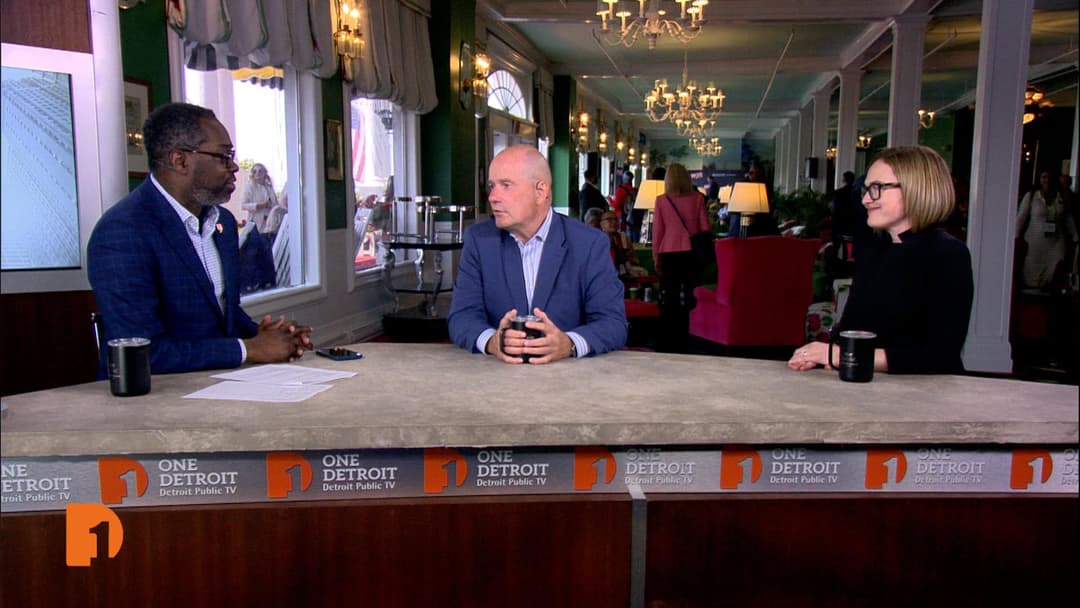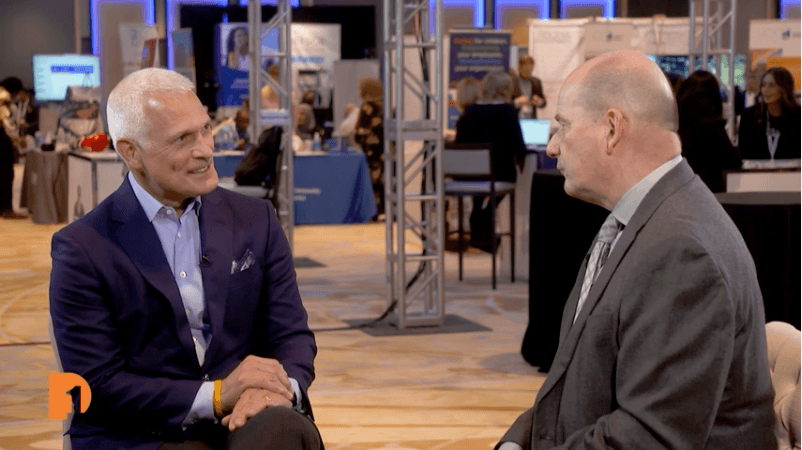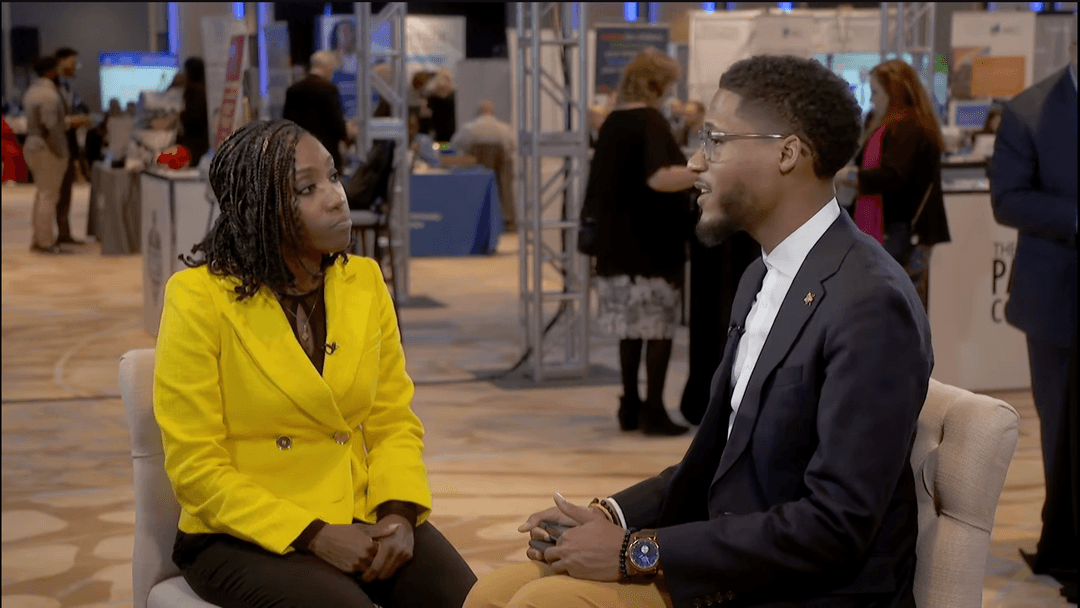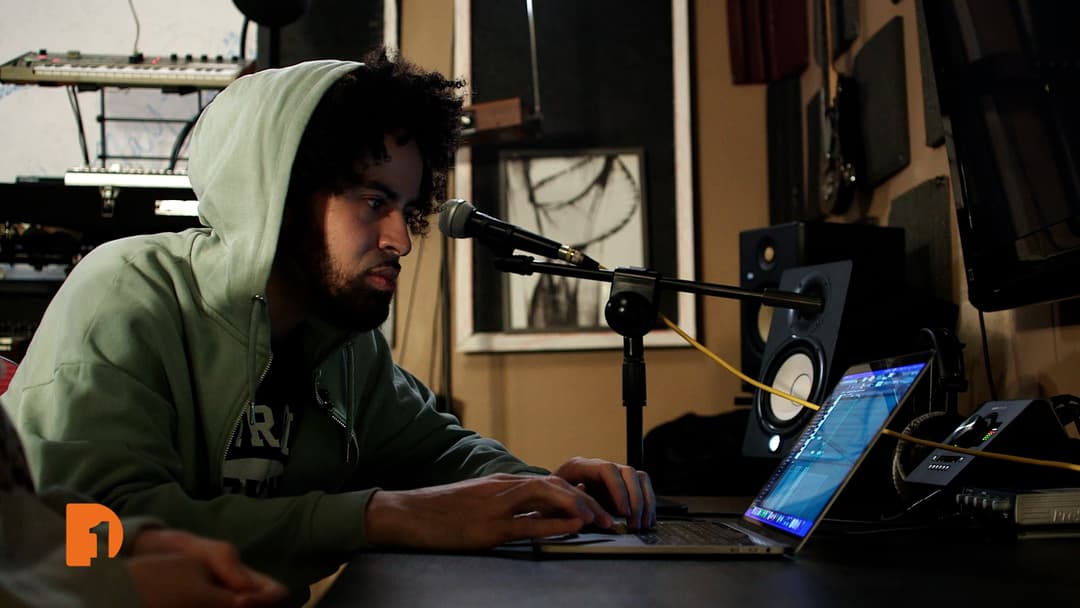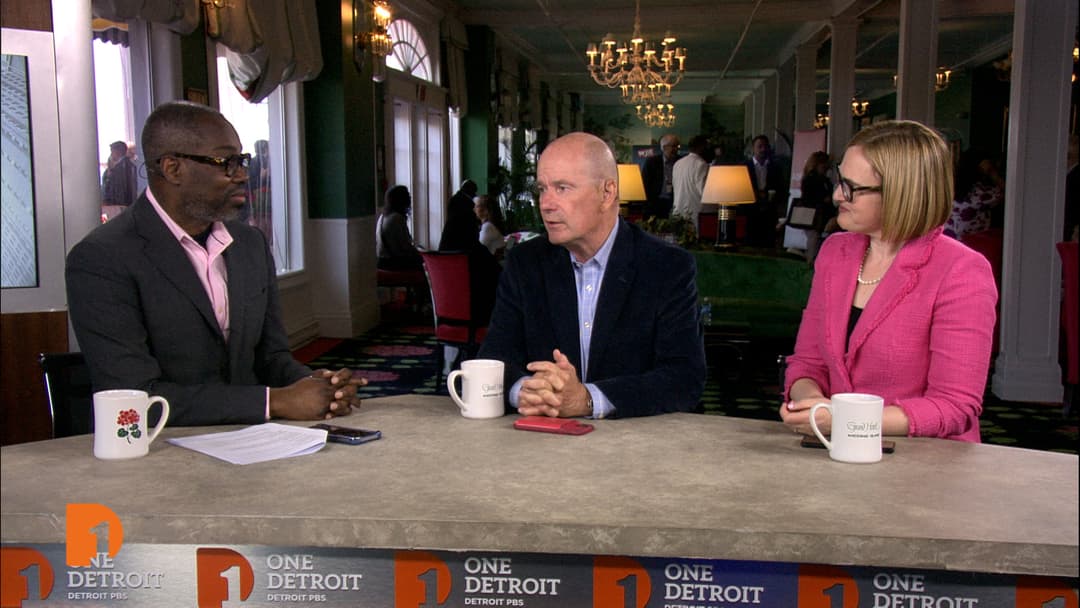Bank of America Michigan President Matt Elliott discusses Detroit’s recovery, housing affordability, Mackinac Policy Conference 2023
Jan 30, 2023
As cities and downtowns continue to navigate post-pandemic recovery, downtown Detroit’s recovery has been night and day, literally. While nightlife activity has nearly fully returned to pre-pandemic levels, weekday activity has been slow to return to downtown Detroit, having an impact on business and the city’s overall economic recovery.
Lending a financial perspective to the conversation about downtown Detroit’s post-pandemic recovery, Bank of America Michigan President Matt Elliott sits down with One Detroit contributor Stephen Henderson, host of “American Black Journal,” to talk about the elements —health equity, upskilling and driving small business, to name a few —Elliott thinks is important for Detroit’s recovery.
They also talk about Michigan’s housing stock, housing affordability, and the bank’s Affordable Loan Solution program that helps Detroiters become homeowners. Plus, Elliott, who is chairing the 2023 Mackinac Policy Conference, gives a preview of what’s in store for the annual conference, including this year’s theme: “The Power of And.”
Full Transcript:
Stephen Henderson, Host of American Black Journal: Matt Elliot, welcome to the Detroit Policy Conference and to Detroit Public Television.
Matt Elliot, President, Bank of America Michigan: Thank you. Great to be here, Stephen.
Stephen Henderson: So before we start, I have to tell our viewers that you’re about to play a huge role in the policy conference world. You’re going to be in charge of the policy conference up north on Mackinac this spring.
Matt Elliot: Yeah. Grateful enough and lucky enough to be the chair of the Mackinac Policy Conference this year.
Stephen Henderson: So let’s talk about what we’ve been talking about here, which is downtown Detroit and how it recovers from the pandemic. I keep saying that it’s kind of six in one hand and half a dozen in another. Night time, it’s not that different anymore. I mean, you go down there and there’s a lot of activity. Daytime, not as much. And I have real worries about that. As a banker though, I’m really curious about how you see the recovery and the key levers to pull to make sure we get back to where we were before.
Matt Elliot: First of all, I think we have to acknowledge the fact that the world is different than it was pre-pandemic. And so getting back to where we were before may mean something different. I do think, though, that Richard Florida, who is here talking about the new role of what downtowns are for was interesting. And we’re, as Detroiters, very well positioned. He said this isn’t the central business district. He said central connecting district, which I think is a really great metaphor for what you and I see when we are downtown.
Number one. Number two, I think that some of the things that we need to keep doing, frankly, are aligned with what we’re doing at Bank of America to help drive economic mobility, especially in communities of color. But stay focused on things like health and health equity, because you can’t be economically mobile if you’re not helping job reskilling and upskilling.
So filling these gaps that we know we have between the skills employers need and the skills that are available. Focusing, thirdly, on small business and helping drive that forward, because that’s going to help our downtown as well. All these small businesses are really key employers and they also knit together neighborhoods, which is really important.
And then the last thing is affordable housing. You’ve got to be able to have a housing stock that people can access. And that’s one of our competitive strengths. When you look at Detroit and the city of Detroit and the state of Michigan, nationally, is that we’re an affordable place to live.
Stephen Henderson: Yeah, more affordable than other cities. At the same time, of course, people in the city will try to make rent and try to buy houses and tell you look, it’s still going to be pretty high. But what about the lending environment in the city right now and the role that needs to play in all of this?
Matt Elliot: Well, I was having this discussion with another banker earlier today. Doing home loans in particular in this city has always been difficult because of the appraisal issue. And that is a federal issue and we’re not getting around that. But a lot of lots of organizations, us included, have come up with some, I think, novel ways to help address that gap. So we’ve got a program we call the Affordable Loan Solution. And what it does is it allows a first-time homebuyer, and that’s the key thing, to get into a home responsibly and sustainably with no down payment.
So we provide a grant for the down payment, essentially. And what’s interesting about that is that, to your point, very often the mortgage payment is far lower than rent. So it actually saves the homeowner money, helps them build wealth, helps us with the housing stock in the city and we win a client. So, from our perspective, that’s a true win-win.
Stephen Henderson: Are we growing the lending environment enough in Detroit? I look at the numbers every year. They’re moving but I feel like the floodgates haven’t opened yet. And we have to find a way to make it possible for most people to buy a house.
Matt Elliot: There’s certainly progress to be made. If you ever go to the mayor’s conference room, he’s got a real-time dashboard and that includes the number of mortgages made in the city. So he’ll always want that to be higher, and frankly, so will we. But we’ve got to find a way to keep grinding these forward.
I think if we keep focused on the solution and keep looking for opportunities, that will happen. But all these things, those four pillars that I just mentioned earlier, are self-reinforcing. So keeping out those consistently over a long period of time, I think will get us where we need to go.
Stephen Henderson: Are you optimistic? Are you bullish on the city of Detroit? Not just downtown, but the neighborhoods, which the lending environment there is, of course, really different from downtown, both in a residential and commercial sense.
Matt Elliot: I think you can look at any situation and see what the issue is or maybe what the problem might be, but also what the opportunity is. And I’m still, and I think a lot of people who are here today are still, squarely in the opportunity camp. There is a lot of opportunity for us here.
One of the things that was a data point I found the other day, which was interesting, is the Department of Energy came out and said the three states in the country best positioned to drive battery manufacturing… Michigan is one of the three. We know we need to win in that regard but that’s going to create jobs, that’s going to create opportunities, and lots of suppliers around that. So these are just other examples of what Richard Florida said, which is the world is tilting in Detroit’s favor. And when was the last time, we said that? It’s been a while.
Stephen Henderson: So let’s look forward a bit to May, to Mackinaw Island, where you’re going to be the chair of the Policy Conference. What do we have to look forward to?
Matt Elliot: Well, the first thing that we’re going to do is we’re going to talk about what we call the power of “and.” That’s what the theme of the conference is. So often, Stephen, you know this, people will come at an issue or come at a problem with a set of either-or choices.
Stephen Henderson: And they fight about it.
Matt Elliot: And what you end up doing is having a discussion around being right, not trying to get it right. And that’s what we want to shift the conversation to do. How do we put some things into maybe some tension, that we realize that if we really work through them together, we get to the best “and.”
So things like sustainability and economic growth, making investments for the future, but still being fiscally responsible, using equity, diversity, and inclusion as a growth strategy. So some of these things that we’re going to talk about, I’m really excited for. There’s a committee of folks and advisors around the chair and the CEO of the chamber to advise it. And when we start talking about this theme, we got a lot of enthusiastic responses. And so I’m looking forward to the conference. The agenda is really shaping up nicely and it’s going to be fun.
Stephen Henderson: Are you looking forward to the Grand Prix here in Detroit? Yeah, that’s all I can think about when I think about Mackinaw. We’re skipping the whole conference. We’re going to have this race downtown and I’m old enough to remember that we used to. I was a little kid last time. But things like that. That’s a great “and.” We’re going to have racing, and safety, and be environmentally conscious. Get it off Belle Isle to downtown.
Matt Elliot: Yeah. There are lots of “ands” in the world, and I think sometimes, the world doesn’t let you find them or doesn’t want you to find them. But in real life, that’s where growth is. That’s where solutions lie. And I’m looking forward to doing it too.
Stephen Henderson: Thanks for coming.
Matt Elliot: Thanks for having me. For having me. Great to see you.
Stay Connected:
Subscribe to One Detroit’s YouTube Channel & Don’t miss One Detroit Mondays and Thursdays at 7:30 p.m. on Detroit PBS, WTVS-Channel 56.
Catch the daily conversations on our website, Facebook, Twitter @DPTVOneDetroit, and Instagram @One.Detroit
View Past Episodes >
Watch One Detroit every Monday and Thursday at 7:30 p.m. ET on Detroit Public TV on Detroit Public TV, WTVS-Channel 56.
Stay Connected
Subscribe to One Detroit’s YouTube Channel and don’t miss One Detroit on Thursdays at 7:30 p.m. and Sundays at 9 a.m. on Detroit PBS, WTVS-Channel 56.
Catch the daily conversations on our website, Facebook, Twitter @OneDetroit_PBS, and Instagram @One.Detroit
Related Posts
Leave a Reply
Your email address will not be published. Required fields are marked*







